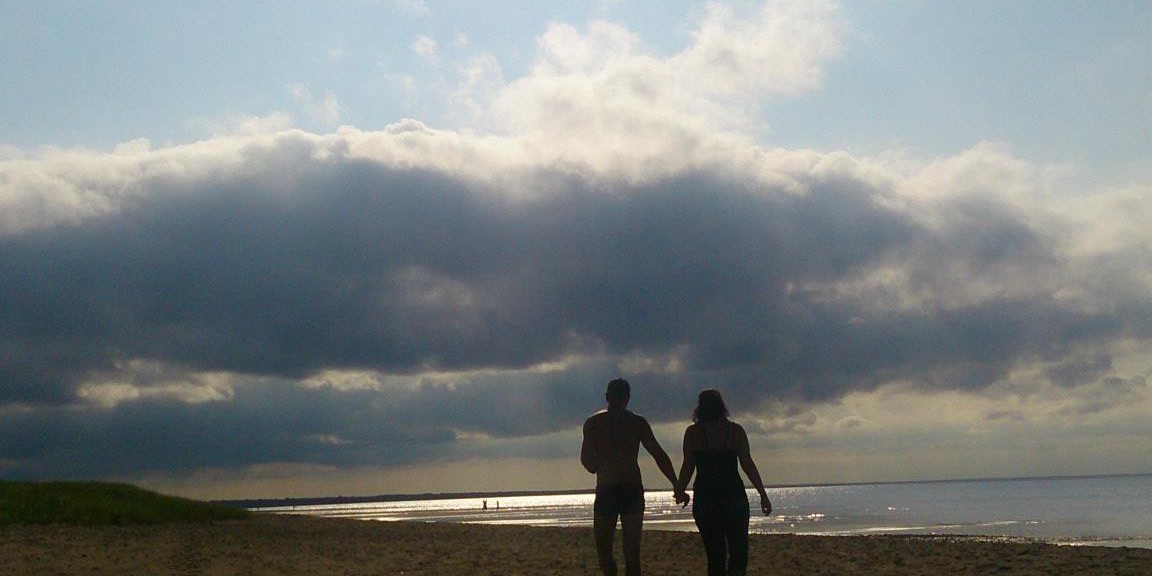Apologies for the dwindle in posts, I’ve never been much of a journal keeper as after about a week I tend to forget or get distracted by other things. I’m back in Italy now, having returned from Greece two days ago, and have spent most of my time sleeping and doing laundry. This last post is going to be a long one, so hold on to your hats.
I’ll start off with detailing my last two days in Lesvos which I spent in Moria once again. I ended up hitchhiking both days to camp (sorry, Dad) which was an experience in and of itself. The first day I was picked up by two Algerian guys who wanted to know all about my life in Canada and even asked me to help them move there. (I had to tell them that I wasn’t exactly in a position to do so but wished them the best of luck and jokingly told them to call Justin the Good to see if he could do anything.) The second day I hitched a ride with an older Greek man who didn’t speak a lick of English. When I made it clear that I was going to Moria he pointed to me and said, “Syria?” I figured out that he thought I was a refugee and had to explain to him that I was in fact a volunteer from Canada which I only managed to do by using Google translate. Considering these were my first two experiences hitchhiking I’d say they went reasonably well.
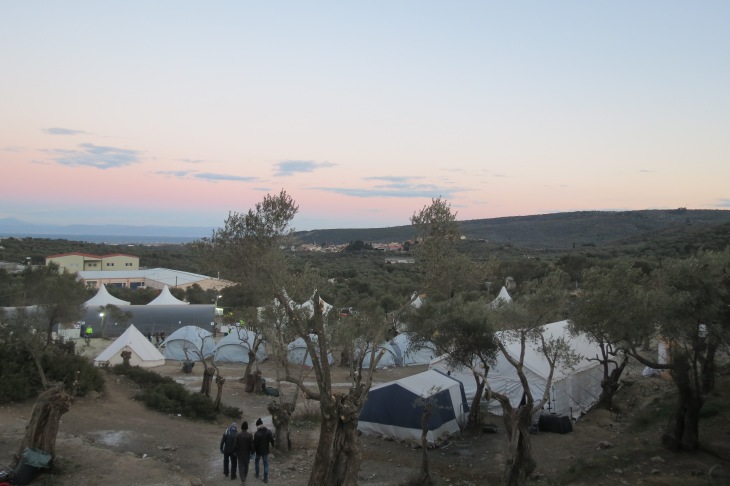 Overlooking Afghan Hill at Moria
Overlooking Afghan Hill at Moria
Back at camp I spent my last two days mostly translating; it was kind of funny because once people caught on to the fact that I speak Farsi I found myself running all over camp helping relay different situations. I eventually started spending more time in the medical tent as well which I concluded I was actually much more useful in than I had originally thought I would be. All the stories told in this post are from people I met in the medical tent.
I also spent some time at the non-Arabic speaking registration line (i.e. the non-Syrian line) helping keep things in order as the police let people in one by one. Due to the bad weather Moria has been fairly empty and Frontex has more or less managed to catch up on registration. I last heard there were only 200 people in the camp (UPDATE: Moria is quite crowded again since the weather conditions have gotten better). That day the registration line was pretty calm and the refugees were waiting very patiently. The police officer I was working with, Vassily, was an intimidating mountain of a man; he was bald, wore aviators, smoked like a chimney and spent most of his time joking with me about his ability to speak Arabic (he spoke none). I’d heard that the Greek authorities have been rather rough on the refugees but I found Vassily to be very docile and quite concerned about the wellbeing of the refugees. He asked me to relay to them that they should take cover or come back if the rain were to come and had me figure out which families had elderly family members or small children to make first priority.
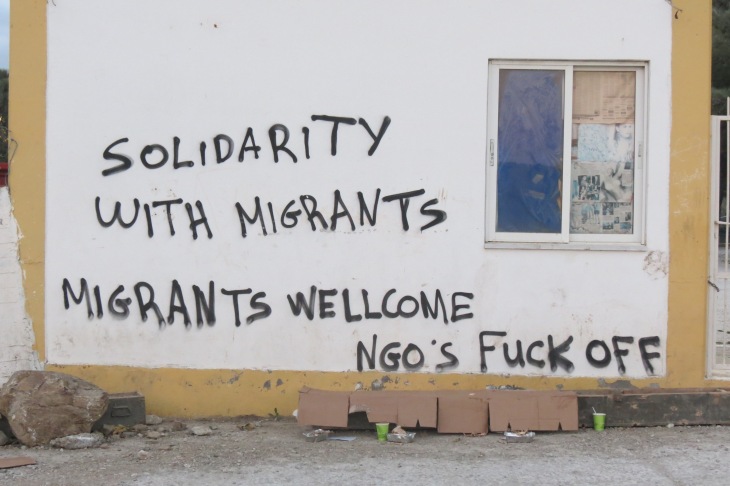 Outside the Frontex Compound at Moria
Outside the Frontex Compound at Moria
At one point I was asked to bring an elderly woman to the medical tent and on the way she told me about her 5 children, 3 of whom she’d already lost to war in Afghanistan. With us was a young man who had met this woman and her family along the way; because he was travelling alone the family took him in and the woman even started calling him her son. Once in the tent, we spent a good 5 minutes trying to figure out her age as she wasn’t sure. This is something that seems to be quite common, particularly with women, as a lot of them don’t have birth certificates or any other documents to tell them their exact birth date. (We had one guy come in who adamantly told us he was 29 even though he definitely looked over 40.) Eventually she decided that she was around 70 and we just left it at that. She was particularly concerned about her blood pressure because she had lost all her medication in the water (something that happens to a lot of people) and began crying when the doctor gave her the BP results. Eventually we were able to reassure her that her levels were only a little higher than normal and were likely due to the stress of the trip. She began kissing all the doctors and telling them that Allah would look kindly on them; it was funny to see the doctors’ reaction to this as some of them were not sure what to say in return. On the way back to the registration line she told me she wished Allah to give me a happy life in which I would find a very good looking husband to have beautiful children with. (She made me promise her that I would have at least 2 boys and 2 girls, so I guess I had better get busy.)
I also met a woman who had been travelling for several days and told us her baby had been crying non-stop since they had left. I could tell she was tired and sick herself but was more concerned for her child than her own well-being. We managed to rehydrate the baby and she was able to nurse him for a while. At one point, a man (another refugee) started speaking to us and told her that she should cover up if she was going to be breast-feeding; it was entertaining to watch her tell him off by pointing out that he didn’t have to start talking to her while she was feeding her child. We talked about it afterwards and I told her that things were not that much different in the West as people still lose their minds when a woman breast-feeds in public. We laughed about how stupid this was and under her breath she said, “I guess men are the same everywhere.”
The last story I want to share is of a woman whose story truly broke my heart; I’ve considered whether or not I would write about it but in the end I realized that it serves as a great reminder of the reality a lot of these people face. I’ll start off by saying that while all of the hardships that the refugees face are tragic, I hadn’t yet heard a story quite this heartbreaking. Maybe that’s because I’d been careful not to ask too many questions or probably because most people were not forthcoming about their past. In any case, after helping translate for a doctor I went back into the waiting area of the medical tent to find a woman sobbing hysterically as a nurse held her hand. I asked if she had any pains and how I could help, instead she told me the reason she was crying was because 20 days prior she was separated from her 16 year old daughter, Lena, somewhere between Afghanistan and Iran. She had already lost her husband (who was murdered by the Taliban) and only her and her 14 year old daughter were left. She didn’t know whether Lena was alive or dead but could only hope that she wasn’t still in Afghanistan as she was sure she would be killed. To be honest, there are no comforting words to say to someone in this situation. We told her that she was safe now and that we would do everything to find her daughter but how are you supposed to comfort a mother who has lost her child? Worse yet, who doesn’t even know whether her child is alive or dead? We contacted the UNHCR and the ICRC who are working to reunite families and they were happy to take down her information. I don’t know how much better the woman felt after that but she seemed a little more at ease and grateful for our help. After she left, the nurse (who was holding the woman’s hand) and I hugged and cried for a long time. It is something that I will never forget and continues to bring me to tears every time I think about it.
My time in Moria was challenging yet rewarding. In all the chaos, there were still light moments to be found and we were all grateful for them. On my last day some clowns came to the children’s tent and played music for everyone as the kids danced around. Slightly further up the hill there was a guy from Texas dancing hip hop while some refugees and volunteers looked on. Eventually some of the refugees joined in with their own traditional dances and there was much laughter about as each man started trying to imitate the other. (I suppose it should be noted that no women danced.) The Texan guy also started rapping which the refugees were quite taken by. When you’re in the midst of it all it’s hard to see the good amongst all the bad and I think for refugees and volunteers alike it’s crucial to have these brief moments of relief when you can forget the circumstances that brought you all together in the first place.
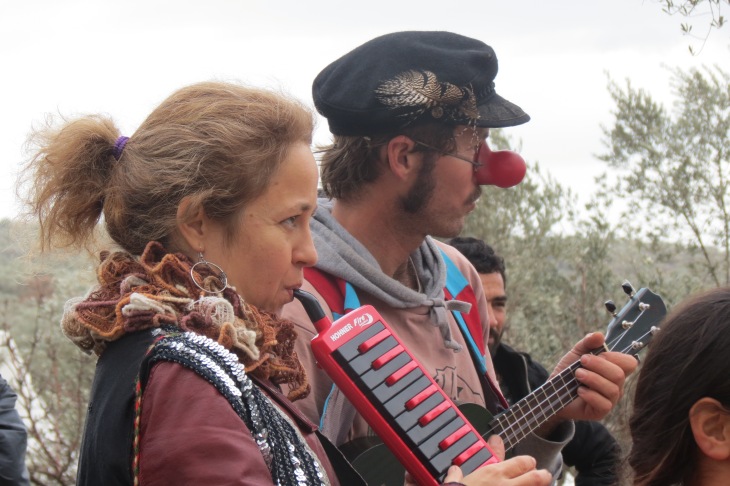
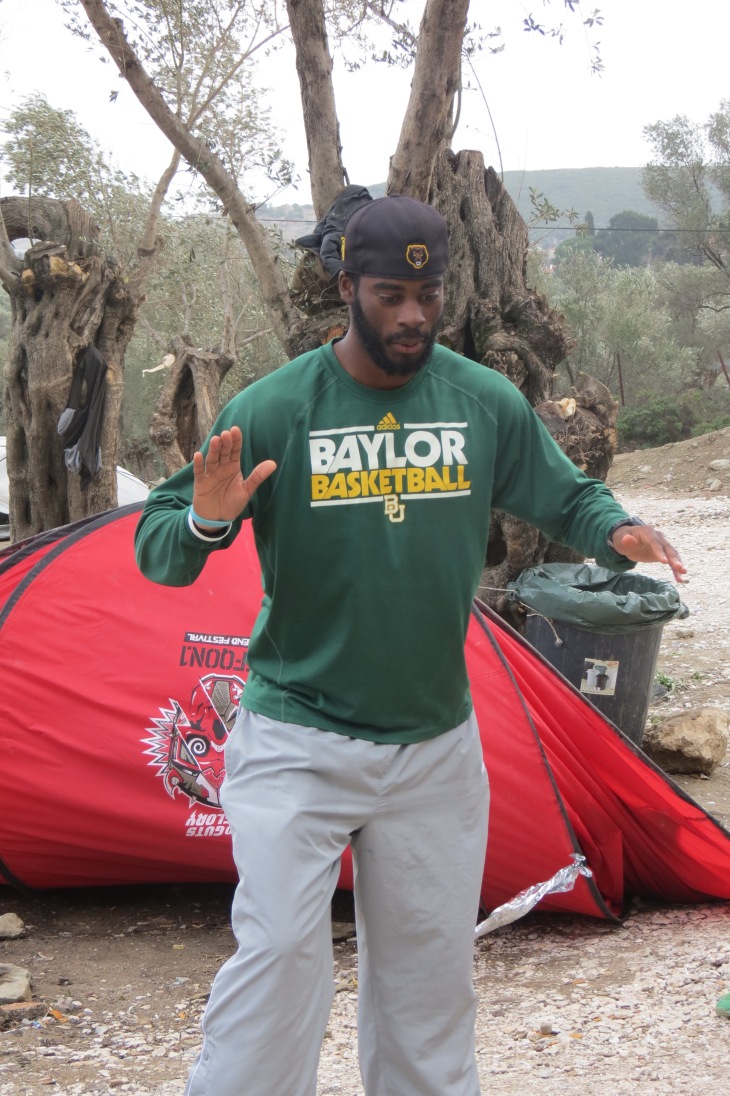
A quick note on the life jacket projects: the projects are growing and I’m happy to say that my two friends who started the mat project were able to pass off their ideas to other volunteers after they left. A solution was made for the tents and the vests are now being laid side by side to create a large surface which is being put under the tents in Moria. This way they are not seen by the refugees, will not be thrown around and will still provide a minimal of insulation from the ground.
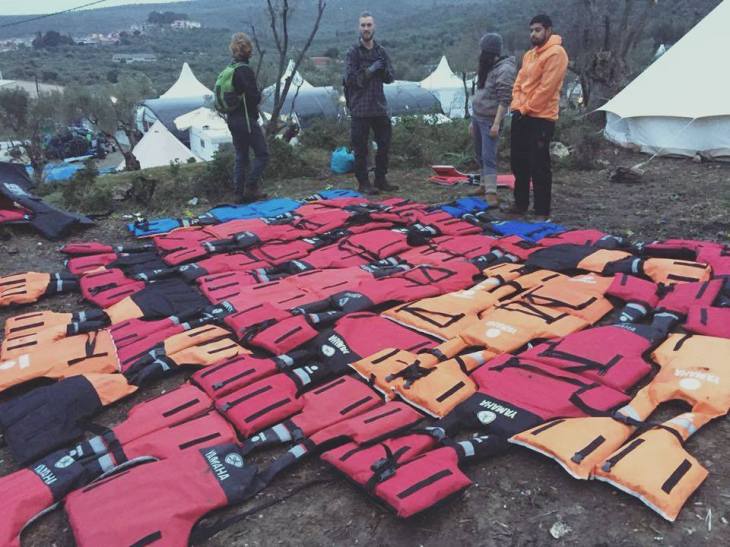 Picture courtesy of Anezka and Mads, Life Jacket Pioneers
Picture courtesy of Anezka and Mads, Life Jacket Pioneers
The woman who made the sturdy mattress from the life jacket foam and the rubber from the dinghies was able to get in contact with someone from the UNHCR and show them her project; they’re currently in talks for funding to create more of them.
I’m also happy to report that the project with the bags being sewn out of the life vest material is well underway.
Lastly, if you haven’t seen it, up in the north of the island there was an enormous peace sign created out of discarded life jackets.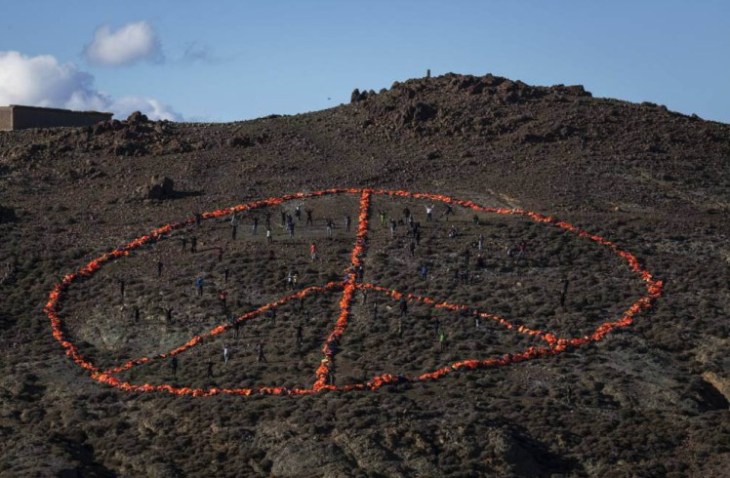
My time in Greece was definitely not long enough. In truth, after observing the situation around me, I’m not sure how much help we’re really giving these people on a macro level. Once they go to Athens and then on to other places (many refugees I spoke to planned to go to Germany, Sweden, or Norway), they still need to seek asylum and start new lives. A lot of them don’t have money, documents or even family left and to be certain many of them will face discrimination and systemic barriers as they try to settle in the West.
With what’s been happening in Germany, France and Egypt over the past few days I can’t help but worry about the wonderful people I’ve met and the journey they still have ahead of them. I also worry about the many who are still on their way to Europe. With the harsh weather over the past week the trip had been more dangerous than ever. Just a few days ago, 34 people tragically lost their lives on the Turkish coast trying to cross over to Lesvos. What’s more, the Turkish government just confiscated a bunch of fake life jackets that have been given to the refugees- let me be clear, when I say these jackets are fake, I mean they are not buoyant and people are drowning. I had heard about this before and even did some investigating with some of the life vests stored at Pikpa but wasn’t able to determine their usability.
To be certain, the situation is bleak on all sides. There are people running for their lives in search of a glimmer of a life that, to be honest, is not necessarily waiting for them on the other side; there are people taking advantage of refugees at any possible moment; there are organizations who are limited by red tape and bureaucracy and governments who are refusing to address the issue with any real, sustainable solutions; and finally there are individuals who are doing the best they can to provide the minimal amount of relief to those in need. It’s far from perfect and more needs to be done by those in the position to do so. However from what I’ve seen, the people on the ground are working their hardest to make the refugees’ stay as comfortable as possible and as I’ve said before, those brief moments of relief are more than needed.
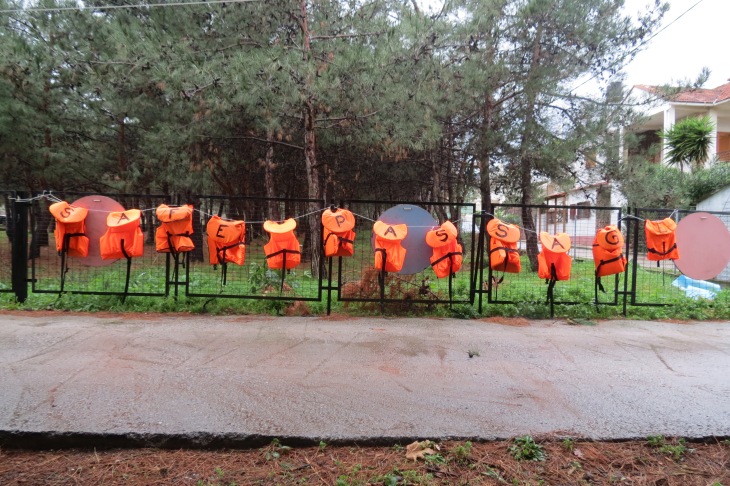 Safe Passage (Pikpa)
Safe Passage (Pikpa)
I’d just like to take a minute to thank anyone and everyone who’s read this blog. I’ve gotten messages from family and friends who have told me how much they enjoyed it and their support is immensely appreciated. As you’ll have noticed I was careful not to post many (if any) pictures of refugees as in the end I decided that I could tell this story without showing their faces. (The Syrian government is diligently scanning social media for pictures of people who have escaped Syria and it just feels better to be safe rather than sorry in all cases.) I hope you’ve enjoyed reading about my experience as I’ve definitely enjoyed writing about it. Before I started this trip I was a little worried about how I would get through it all, both emotionally and physically. I have to say I faired better than I thought I would; of course it was physically taxing and there were moments when tensions and emotions ran high but overall I feel this trip has started me off on a path that will bring me back to similar situations in the future. I’m going to keep this up for anyone who wants to read in the future and hopefully for more adventures somewhere down the road.
Until then, take care, be safe, and be kind to one another.
Chloe
